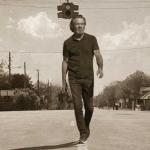Review of Warm Bodies, Directed by Jonathan Levine
R is dead. Which doesn’t stop him from being hungry, eating people, and then feeling bad about being hungry and eating people. Nor does it stop him from feeling a good deal of existential angst over his lack of connection with other people, unlike the ‘Boneys’, skeletal monsters who feel no such angst and indeed delight in consuming anything and everything with a heartbeat. Is there any opportunity for escape from this lonely cycle of hunger-consume-angst-repeat? In fact, there is—and that opportunity comes in the form of Julie, the living person whom R decides to romance rather than to [eat]. Will love for Julie be enough to rescue R from his nightmarish afterlife? Will the zombies be able to convince the living that the dead are only mostly dead and not all dead? Or will the Boneys descend on everyone and destroy humanity in an orgy of consumption and destruction?
Warm Bodies is neither a great zombie movie nor a great romantic comedy, but it manages to be an pleasant enough hybrid of the two to be worth your time. With a competent and enjoyable cast (including the always likeable Nicholas Hoult, and a brilliant comic performance from Rob Corddry), this film is surprisingly warm and lively given the number of corpses it features. And while I haven’t read the book, I’ve heard good things about it as well.
What’s more, there’s some material here for theological reflection as well. As I said, this is not a great zombie movie. Zombies are traditionally mindless creatures of pure appetite with nothing on their minds but the pursuit of braaaiiins. (There are a couple of exceptions to this, but I Am Legend adapted a story that originally involved vampires rather than zombies, and Cell was written by Stephen King and so shouldn’t really count anyway.) The introduction of an introspective and emotionally complex zombie is a pretty big red flag that something different is going on. In this case, it’s a big red flag that’s rubbed in your face while playing a trumpet, just so you don’t miss it. [Spoiler alert.]
You see, there are three sorts of beings in the world of Warm Bodies. As already mentioned, the Boneys are those who only consume. There is no beauty or remorse left in their lives; they are walking skeletons who are nothing but appetite. If they have any rationality at all, it is used merely to keep the feast going. The second group is the Corpses (zombies like R who still bear a resemblance to human being, albeit pasty, lurching ones). These are also driven by their appetites and dedicated to consumption, but they still possess glimmers of humanity. They have the vague understanding that what they are doing is wrong and that there must be a better way of life out there somewhere. The movie is the story of R attempting to climb out of this way of life and into the land of the third category of people: the living.
The living are the remnants of humanity proper. They have walled themselves off from the Corpses and the Boneys (not that they would recognize a difference between the two of them) and are attempting to preserve something of civilization. Yet, even they can’t truly live in isolation—they continually have to wander into the land of the dead to forage for supplies. It is on one such trip that R meets (and rescues) Julie. The connection that he makes with her opens the door for R’s return to humanity. That connection likewise inspires the other Corpses to rise above their appetites and try to be something better—something more human.
At this point, it should be pretty obvious what one of the major themes of the movie is. Human life should be neither one of isolation (the humans walling themselves off) nor pure consumption (the Boneys), but should be based on personal relationships that overcome our baser desires (the appetites of the corpses) and lift us up to the fully human life together we were intended to live. And of course as Christians we can be on board with this theme, so long as we don’t push it too far. Human beings were not intended to live in isolation—being alone is “not good.” Nor are we to be dominated by our appetites, giving into them at every opportunity and consuming everything our gluttonous souls can devour. The fully human life we are called to live requires both self-restraint and community with others.
Where we will differ with Warm Bodies is in our understanding of how this life can be achieved. We know that human beings are sinful and that left to our own devices, unbridled consumption and increasing isolation are just two of the many wicked roads we would sprint down as fast as we could go. The only way not to be left to our own sin is through the atoning work of Christ on the cross. By grace, the Gospel lifts us out of our isolation and restores us to a right relationship with our heavenly Father. It enables us to restrain our appetites, and places us into a community where the relationships we share cannot ultimately be broken because they are not based on us. A community of people united by the forgiveness that comes through Jesus is the only community where man finds his final purpose and lives life in a way that is fully human. Our care for others is a symptom of our spiritual resurrection, not its source. Before these dead, dry bones can ‘love thy neighbor’, they must be given flesh, and our stone hearts must be transformed into living ones. Only then can we truly love one another.
Dr. Coyle Neal is Assistant Professor of Political Science at Southwest Baptist University in Bolivar, MO, where he tries his hardest to restrain his desire for unbridled consumption of donuts and coffee.












